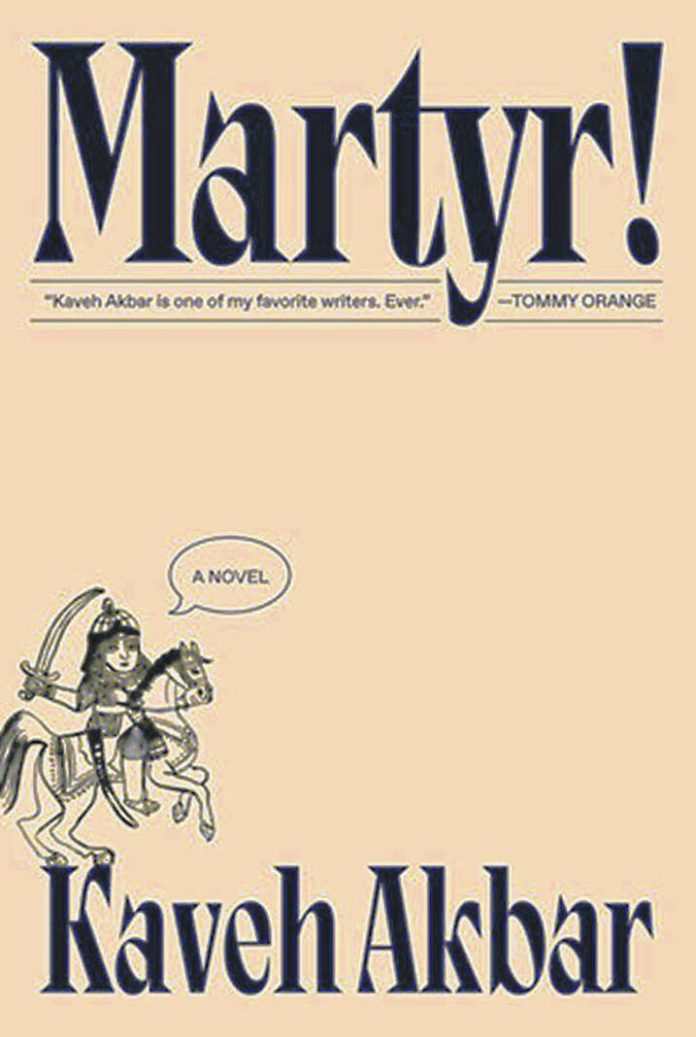It’s more than passing strange that in two months a pair of virtuosic novels have pivoted off similar events: commercial aircraft shot down amid heightened political tensions. Ed Park’s “Same Bed Different Dreams” re-creates the Soviet Union’s 1983 targeting of Korean KAL 007; and now Kaveh Akbar’s dazzling “Martyr!” evokes the 1988 tragedy of Iran Air Flight 655, blown out of the sky by missiles fired from the USS Vincennes, which mistook the jet for a military fighter. A poet and editor at the Nation, Akbar taps his impeccable ear to enrich this fiction début.
Iranian American Cyrus Shams is an aspiring writer who, post-graduation, lingers along the margins of his Indiana university. Raised by a single father, Ali, a laborer at a poultry farm, Cyrus grieves the absence of his mother, Roya, who perished on Flight 655, just before he and Ali immigrated to Fort Wayne. As a student he’d almost succumbed to various addictions — “Cyrus’s true love, his bedrock, his soul mate, was alcohol” — but by 2017 he’s rooted in a fragile sobriety. (Among its many merits, “Martyr!” is an exemplar of recovery literature.)
He works for junior physicians; they practice communication skills as he cosplays patients and family members. He cycles through lovers of both sexes, including Zee Novak, a best-friend-with-benefits. Zee encourages him to reach out to Orkideh, a lesbian émigré artist based in New York. Diagnosed with terminal cancer, Orkideh has opted to spend her last weeks as an exhibit at the Brooklyn Museum, discussing mortality with visitors. She’s the ideal muse for Cyrus’ book project, a series of vignettes about martyrs, whose deaths transcended their lives, resonating beyond centuries and tribal loyalties.
Cyrus’ empathic conversations with Orkideh form the crux of “Martyr!,” titillating clues to a shared mystery. Akbar shifts, kaleidoscope-like, among characters living and dead or captured in dreams, a tapestry of secrets that unravels. He contemplates Persian legends, global politics, signifiers and signifieds and, crucially, the fluidity of identity.
Cyrus, Akbar writes, “felt completely awash in time: stuck between birth and death, an interval where he’d never quite gotten his footing. But he was also awash in the world and its checkboxes — neither Iranian nor American, neither Muslim nor non-Muslim, neither drunk nor in meaningful recovery, neither gay nor straight. Each camp thought he was too much the other thing. That there were camps at all made his head swim.”
The narrative resolution comes into view like a city glanced outside an airplane window during final approach; and yet there’s a twist, a sudden pitch of runway as the novel touches down. Akbar’s ending feels operatic, orchestrated, the only technical choice I question, but it still pulses with lyrical precision. In our age of religious warfare, when the definition of “martyr” is contested among the children of Abraham, “Martyr!” thrillingly depicts why we cobble selves from alloys of words and cultures.
“We spend our lives trying to figure out how to pay back the debt of being,” Orkideh observes. “And to whom we might pay it.”







